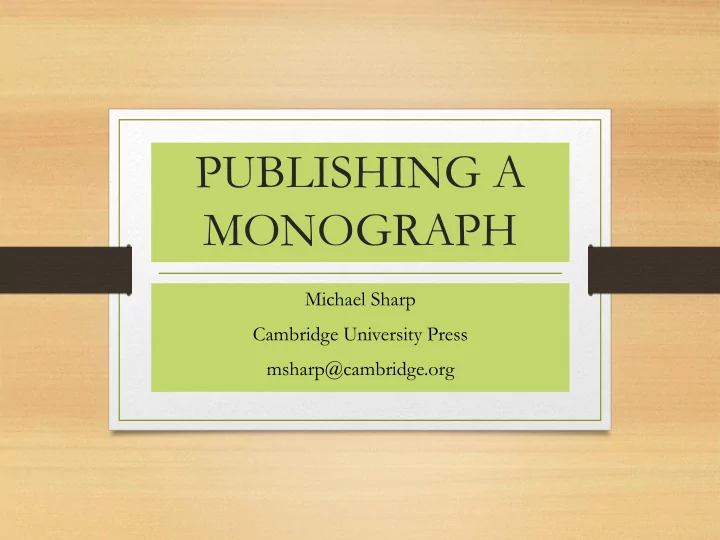

PUBLISHING A MONOGRAPH Michael Sharp Cambridge University Press msharp@cambridge.org
The research monograph • A sustained original argument at book length • Aimed at scholars and advanced students so can assume a lot of basic prior knowledge • Still an essential part of the ecosystem of scholarly communication, especially in the Humanities • Still required by many institutions to gain permanent employment or tenure and promotion • Hundreds are published each year in Classics alone
The economics of research monograph publishing • Sales mostly to university/college libraries but also to some specialists • Severe pressures on most library acquisition budgets – NB STM journals dominant • Greater sharing of resources between libraries • Steady decline in average sales over many years, and most monographs now sell 100-250 hardbacks and ebooks combined • In most cases the limited size of the market means they have to be issued initially as a high-priced hardback and ebook, though sometimes with a subsequent paperback • There are exceptions for certain kinds of research monographs at certain publishers, e.g. Academic Impact at Cambridge, but these are usually reserved for more established scholars writing really major books
Publishers of research monographs • University presses, e.g. Cambridge, Oxford, Edinburgh, Princeton, Chicago – owned by parent university, governed by Syndics/Delegates who are senior academics, not-for-profit • Commercial, e.g. Routledge, Bloomsbury, Brill, De Gruyter – vary in size and international spread • Institutions, e.g. Center for Hellenic Studies, British School at Athens
Theses v. monographs • Theses are written primarily to obtain a degree. While they should have a central argument, they must also show the examiners you have worked through all the necessary primary material and secondary bibliography and they often contain many long footnotes. • Monographs are for the wider scholarly community and should be constructed solely around advancing an argument, introducing only as much background and discussion of other bibliography as is necessary to do so; technical or side issues may be better consigned to appendices or even published separately as articles.
Publishing a book from a thesis • Take examiners’ and supervisor’s advice • Should I try to publish a book or a series of articles? • If a book, does the thesis require serious revision and expansion? • Talk to commissioning editors, either at conferences or by email/phone
Choosing a publisher • Take advice from people you know and trust • Size and spread of list in your area • Fit within a series? • Quality • Market considerations • Personal factors • Career considerations • Money • Multiple submissions?
Constructing a book proposal • Outline the book’s structure and argument, bearing in mind the commissioning editor is unlikely to have your specialist knowledge • How does the book fit into previous and current scholarship? What new contribution does it make? • Why does the book matter? • Likely market/audience – think big but not too big! • Length – normal range 80,000-130,000 words • Has any material been previously published elsewhere?
Constructing a book proposal (cont.) • Do you have to post the thesis in an institutional repository? • Illustration requirements and costs • Schedule for completion and how much already written • Title – don’t be too clever or allusive! • Publishers’ websites often contain guidelines • 4-6 pages are usually the minimum required for a proposal • Write in good English free of spelling and grammatical errors!
Illustrations • Buying photos and permissions to publish them can be very expensive, BUT some museums and organisations offer free usage for scholarly books or special discounts to certain publishers • Subventions may be available from your institution or some specialist academic organisations • Do you absolutely need every illustration?
Editorial process • Commissioning editor reviews proposal • May ask for more material, e.g. copy of thesis, examiners’ reports, sample chapters • Seeks advice from expert referees – usually 2 required and anonymous peer review/refereeing is the foundation of good academic publishing • Discusses referees’ reports with author – response usually ‘revise and resubmit’ or ‘reject’ • Once satisfied, asks for authorisation from publishing committee to offer a contract • Sometimes a further round of refereeing • Your contract will usually require you to give the publisher first option on your next book • Advance contracts – BEWARE!
Publication process • Pre-production checking and record creation (for Production and Marketing) • Copyediting – this is not rewriting of your text! • Design • Typesetting • Page-proofs – usually only 1 stage for author • Indexing • Printing and e-book creation • Formal publication and marketing, e.g. review copies to journals, display at conferences
Digital publishing and monographs • XML (Extensible Markup Language) – can create much more powerful files, especially in the areas of indexing and cross-referencing • POD (Print on Demand) – quality improving all the time, increasingly used for research publications • Ebooks – growing but with variable take-up in different subjects, though likely to expand rapidly in the way of Covid-19
OA (Open Access) and the research monograph • Green v. gold OA – BPCs (book-processing charges) • Probably some form of OA requirement for monographs from REF 2027 and already one for ERC-funded projects • Creative Commons Licenses: • CCBy most common and very liberal • CCByNCND (Non-Commercial, No Derivatives) • CCByNCSA (Non-Commercial, Share Alike) • CCZero – no author attribution and rare
Take heart – editors do want to publish books by younger authors! • You have usually had far more time to develop and write your book than many academics later in life • You often have fresh and exciting new ideas and approaches • Working with an author on their first or second book can often lead to a fruitful and productive long-term relationship
Recommend
More recommend